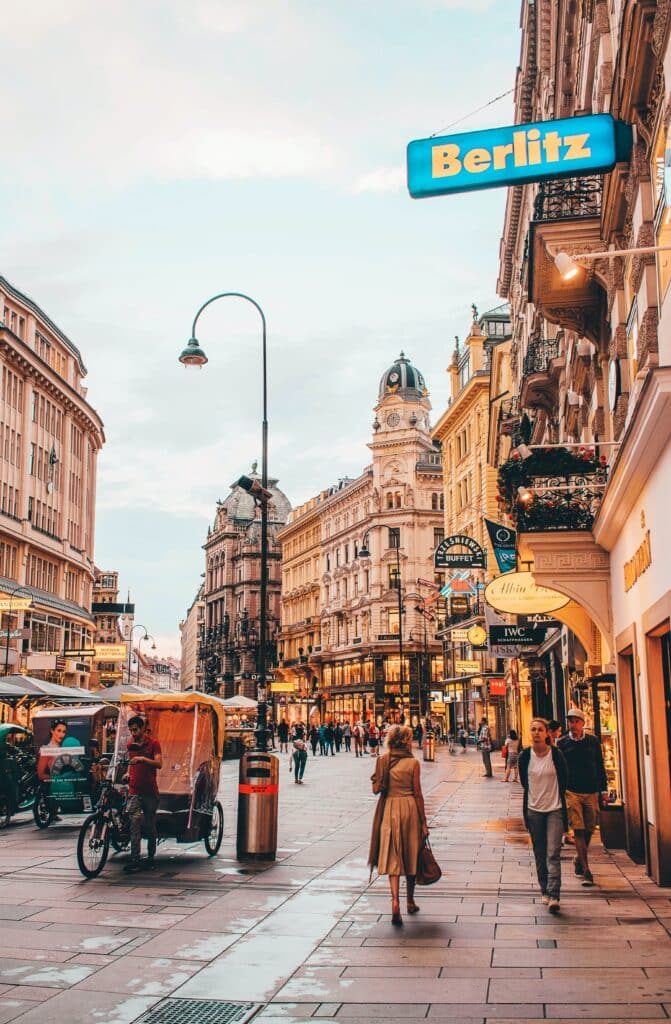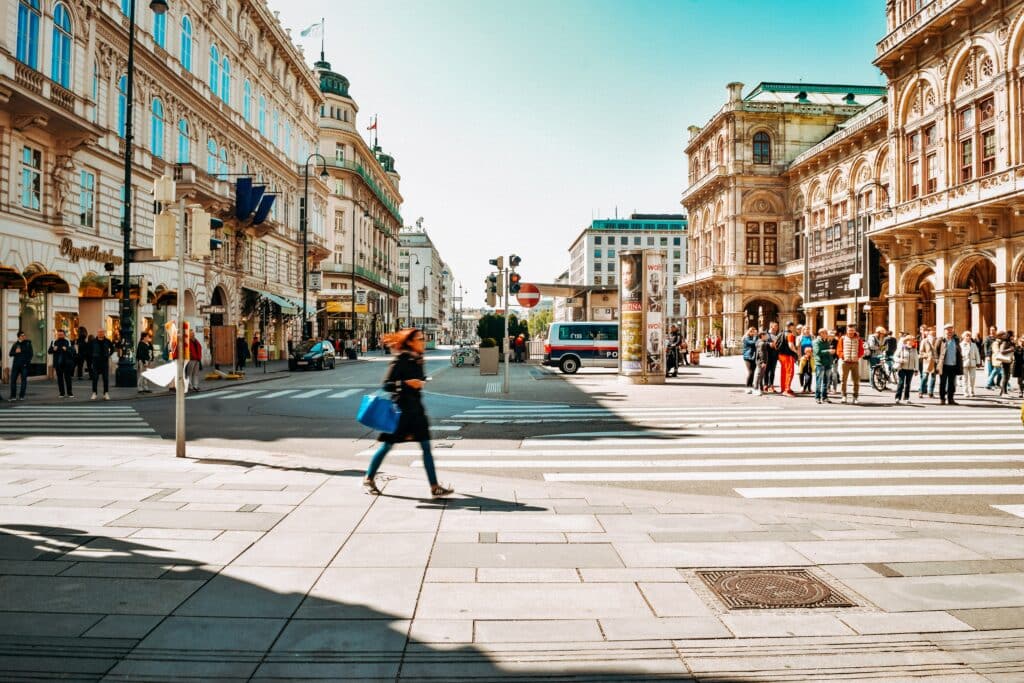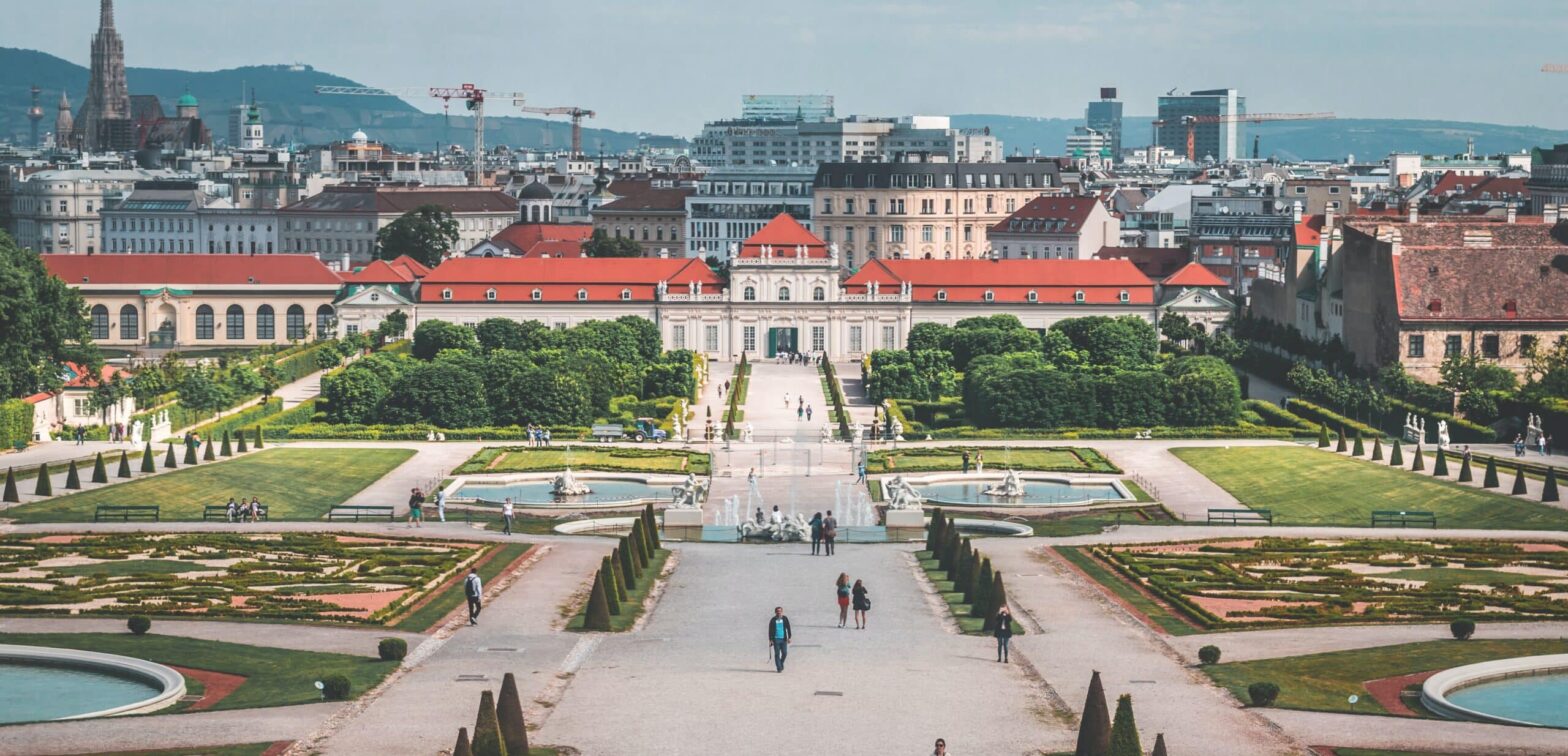Are you ready to relocate to a majestic country renowned for its exceptional cultural heritage? Not only is it the homeland of iconic cultural figures such as Klimt and Mozart, but Austria also offers picturesque alpine scenery and outdoor activities that attract expatriates seeking a better quality of life. From Vienna to Salzburg, Austria is a great place to live and work!
Here is a guide with some useful information to help you make the most of your relocation to Austria.
Moving to Austria: some formalities
EU citizens do not need to apply for a visa or residence permit to live and work in Austria. Third country nationals, such as Americans, planning to stay for more than six months, must apply for a residence permit before moving. In all cases, you must possess a valid passport as well as health insurance to cover your medical expenses throughout your stay.
Living in Austria: pros and cons
Pros:
- High quality of life
- Employment opportunities (good level of income)
- Plenty of outdoor and cultural activities to enjoy with your family and friends
- A premium healthcare system
- Superb local culture
- Solid education system: local and international schools
Cons:
- The language barrier for non-German speakers
- The cost of living
- High income taxes
Meldezettel and Anmeldebescheinigung
All expatriates (including EU citizens) must fulfill certain formalities to qualify to live in Austria for more than three months. Firstly, you must fill out the residence registration form (Meldezettel) and submit it to the town hall of your place of residence. This provides the Austrian authorities with knowledge of where you live.
If you plan to stay in Austria for more than three months, within four months of your arrival, you must apply for the Anmeldebescheinigung certificate. This document grants you temporary residence in Austria. For more information on obtaining this certificate (for a fee), click here.

Healthcare services
Austria boasts one of Europe’s best healthcare systems. The Austrian healthcare system relies on modern and efficient healthcare facilities, both public and private, with compulsory public health insurance. All residents, including expatriates, must subscribe to the public healthcare insurance, and obtain an e-card, which grants them free access to public health facilities. Many expatriates prefer, however, to subscribe to an international health insurance for four main reasons: premium services, freedom to choose their healthcare provider, tailored health insurance plans, and the guarantee of prompt medical treatment in Austria and abroad.
Do you have to speak German to relocate to Austria?
While it is possible to navigate your expat life in Austria without speaking German, especially in metropolitan cities such as Vienna, integrating into Austrian society, finding employment or dealing with everyday life (including finding accommodation) can be challenging without any knowledge of German.
In which city should you live?
There are a number of nice places where you can settle in Austria, each with its pros and cons. The cosmopolitan city of Vienna is a popular destination among expats mainly because of its high quality of life and dynamic job market. And for those reasons, it consistently ranks among the world’s best cities in which to live. For non-German speakers, the multicultural Austrian capital is undoubtedly an ideal place to relocate. Salzburg, the birthplace of Mozart, is perfect for outdoor activities enthusiasts, especially those who enjoy winter sports. While Graz attracts digital nomads, Sankt Pölten offers abundant opportunities for nature lovers.

How to find accommodation?
In big Austrian cities, most available rentals, co-rentals (WG-Zimmer) and sublets are usually studios and apartments (bare or furnished — teilmöbliert or vollmöbliert). If you plan to relocate temporarily to Austria, sublets (governed by Austrian rental law) are an excellent option. Like in other countries, landlords may ask you for proof of employment, a security deposit, and house insurance. Real estate agency fees can range from two to three times the rent. It is also possible to purchase property in Austria, but non-EU citizen need permission from their home country’s government to do so.
Useful links to find accommodation:
Working in Austria
If you or your partner have not yet found a job before moving, there is no need to worry! Austria offers numerous professional opportunities for expats across a wide range of industries. These include technology (a fast-growing field), finance (Austria is home to major international banking groups), tourism (especially in Vienna), and R&D (with a focus on environmental technologies, medical sciences). If you are considering applying for a job in an international organisation, you’re in luck as Vienna serves as one of the four headquarters of the United Nations.
While speaking German is undoubtedly an asset, and often a necessary skill for finding and integrating into a job, it is also possible to find work in an international organisation where a good command of German is not an absolute requirement.
The stability of the Austrian economy also makes it a perfect environment for foreign entrepreneurs!
If needed, the national employment agency (Arbeitsmarktservice) can assist you in finding a job..
Getting around
The country has an extensive air and rail network. The major airports are in Vienna, Innsbruck and Salzburg providing easy access to destinations worldwide. Managed by OBB-Austrian Railways, the Austrian rail network offers affordable and convenient options to explore Austria’s wonders. Daily transportation needs can be met through public transport such as the metro (U-bahn in Vienna) or buses, walking or driving, depending on the city to which you move!
Opening a bank account
Once you become a resident in Austria, opening a personal or a business bank account is straightforward. You can opt for the Austrian branch of your current bank or choose a national bank such as Bank Austria. To open a current account (Girokonto), you will need to provide the staff with a valid passport as well as proof of residence in Austria and, in some cases, a job certificate.
A few Austrian specificities
- In imperial Vienna, Kaffeehauskultur is truly an institution for everyone, local and expatriate alike.
- Gemütlichkeit, the Austrian art of living, celebrates comfort in a café or in the open air
- Austrians share a common passion for gastronomy
- Vienna is considered the European cradle of music
- Austrians are early risers, and administrative services often open as early as 7 am!
- People value openness in social relations
Here are some wonderful things to enjoy:
- Treat yourself to a luxurious coffee break at Café Sacher
- Try Austrian culinary specialities at Naschmarkt, Vienna’s most famous market
- Enjoy skiing or rafting in the magnificent Tyrol region
- Take some time to contemplate the sublime lakes of Salzkammergut
- Visit Eggenberg Castle in Graz
- Explore local culture and the centuries-old imperial palaces in the capital
- Celebrate classical music at the Salzburg Summer Festival
- Follow the wine routes of Styria with friends
- Relax with a soothing spa treatment at the Rogner-Bad-Blumau hot springs
- Marvel at the stunning landscapes of the Wachau region
- Spend some time in Salzburg, Mozart’s birthplace
- Delight in the tumultuous cascade of the Krimmler Wasserfälle, Europe’s largest waterfall
- Journey across the Eastern Alps on the Semmering Railway
